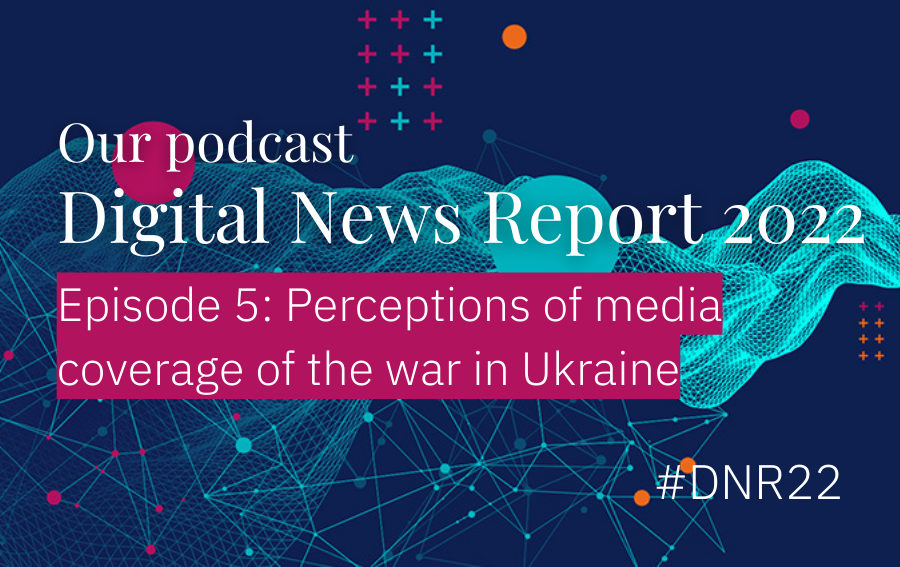Our podcast: Digital News Report 2022. Episode 5: Perceptions of media coverage of the war in Ukraine

The topic
In this special episode of our Future of Journalism podcast, we look at findings in our Digital News Report 2022 on how people are engaging with news around the war in Ukraine. We explore data from five countries on whether war coverage is leading to greater news use or turning people away, and we ask how people rate the news media's performance during the war.
The speakers
Dr Kirsten Eddy is a Postdoctoral Research Fellow in Digital News at the Reuters Institute for the Study of Journalism. She studies the interplay of journalism, politics, and digital media, with a focus on moral and civic media and political discourse. She is the author of the Digital News Report 2022 chapter on how younger audiences are engaging with news
Our host Federica Cherubini is Head of Leadership Development at the Reuters Institute. She is an expert in newsroom operations and organisational change, with more than ten years of experience spanning major publishers, research institutes and editorial networks around the world.
The podcast
Listen on: Spotify | Apple | Google
The transcript
Engagement in different countries | Preferred sources of news on the war | News avoidance and war coverage | Interest in news and war coverage | How audiences rate coverage of the war
Engagement in different countries ↑
Federica: So the war in Ukraine started after we carry out the main survey, which did a news report is based on what did you do to learn about how people are engaging with the news about the war.
Kirsten: As soon as the war in Ukraine started, we really wanted to better understand how people have been accessing news about the conflict, and to see what impact this might have on some of the trends that we'd found in our main survey. So we ended up commissioning YouGov to carry a separate follow up survey in five countries: Brazil, Germany, Poland, the UK and the US. And in that we included both new questions specifically about the conflict as well as a handful of key questions from the main Digital News Report survey. So things like news interest use, avoidance and trust. And this allowed us to directly compare our pre-conflict results from the main 2022 survey and the during-conflict follow-up survey.
Federica: Why did you choose these specific countries?
Kirsten: We chose these countries because they helped us to gauge both differences and similarities based on different levels of proximity to the conflict, ranging from Poland, which directly borders Ukraine, to countries like Brazil and the US which are on entirely different continents.
Federica: Across the five countries you look at what are the news audiences saying about how closely they're falling the conflict?
Kirsten: Across all five, we find that a majority are following the conflict at least somewhat closely, though the attention is highest in Germany, which is not just geographically close to Ukraine but it's also a place where ordinary people are feeling the effects of the conflict on things like energy prices. This attention is lowest in Brazil, which is politically and geographically farthest from the conflict. So not necessarily surprising.
Federica: How does this compare with engagement with news in general or any differences with age or gender for example?
Kirsten: For the most part, what we see here is in line with our main survey data on those who are not consuming any new sources at all in markets, like the US and the UK, but we do see that in countries like Brazil and Germany, the proportion of 18-to-24 year-olds who are not following the conflict at all, is particularly high when we compare it to other age groups. And I think in places like the US and the UK, we see that women are slightly more likely than men to not be paying close attention to the war.
Preferred sources of news on the war ↑
Federica: You look at what sources of information and news people pay attention most to when it comes to the war. What does the research show?
Kirsten: It was immediately clear, as we've seen with other major world events in the past, that people turn more to TV news at times of crisis. We asked respondents which news source they're paying the most attention to when it comes to the conflict. And television news tops the list for three of our five countries, particularly Germany and Brazil. We also see a lot of attention to online sources overall. So when we combine online news sites, non-mainstream sites and social media, this is particularly prominent in places like the US and Poland.
Federica: Again, do you see any differences in behaviours according to age or any other factor?
Kirsten: We do see some differences mainly by age and by country. The most obvious one reflects what we also find in our main survey, which are the splits we see in television versus social media use between younger and older cohorts. So in the UK, for instance, people who are 55 and older are far more likely than 18-to-24 year-olds to pay the most attention to TV news on the conflict. And then nearly eight times as many 18-to-24 year-olds are paying the most attention to social media news on the war as those who are 55 and older. And we also see that TV is a dominant source of news about the conflict in countries like Germany. But social media is uniquely important in a country like Brazil.
News avoidance and war coverage ↑
Federica: You also poll people on how much they are avoiding the news, meaning we can compare levels both before and after the beginning of the war. Did you see any shift in any of the countries you look at? And can you actually put it down to the war in particular?
Kirsten: Yeah, we were particularly interested in whether some of the key trends that we found in our main survey, especially, as you just noted, increases in news avoidance, were reversed by the extensive coverage of this war. And we actually find little evidence that these trends of news avoidance have been reversed, even temporarily. And in some cases, we find possible evidence they've actually been accelerated from it. So, in Germany, Poland, in the US, the proportion who say that they sometimes or often actively avoid the news has actually increased. News avoidance in Germany is up by seven percentage points, just from shortly before to during the conflict. And to put that in context, that increase that we see in just two months, is larger than what we saw in the five years from 2017 to 2022 in news avoidance in Germany.
This isn't necessarily surprising, because we know that one of the main reasons that people avoid the news is because of the negative effect that it has on their mood. And we also know that war coverage is, of course, you know, by its nature, deeply depressing and concerning. But in some countries where news avoidance was already quite high, like the UK and Brazil, we don't see evidence of a further increase. But we also don't see a decrease in these places, either. And I think in terms of your question of, you know, whether we can truly attribute this specifically to coverage of the war? No, I think it's important that we be cautious about this. I think, just to take one example, we do know that other major domestic stories, for instance, the ‘Partygate’ scandal in the United Kingdom, were unfolding at the same time as the conflict. And these may have also influenced people's attitudes and behaviours around the news.
Federica: That's super important, thank you. So people who say they're avoiding the news, are they shunning it completely? Or is something more nuanced, occurring?
Kirsten: This is a great question. We do see that in places like Poland, despite the increase in news avoidance, the proportion of people who say that they access news several times a day did substantially increase. And in Poland, we find that around 40% of people who access news several times a day during the conflict, are also saying that they ‘sometimes’ or ‘often’ actively avoid the news. So, I think what these things together tell us is that news avoidance and news use are not mutually exclusive, and that people can make a conscious decision to moderate their news use or perhaps just avoid coverage on particular topics, while still regularly checking in with it.
Interest in news and war coverage ↑
Federica: Has coverage of the war managed to reverse any of the downward trends in the proportion of people who say they're really interested in the news.
Kirsten: This is a bit of a mixed picture. Like news use, we see the biggest change in in news interest in Poland, where interest is up from before the conflict. But, because declines in US interest have been so steep since 2020, this increase really only represented a return to 2021 levels. In the other countries that we studied here, we really found that interest has either been unaffected or in places like Brazil continues to fall. So, I think despite the severity of the conflict, it's done little to reverse some of the declining levels of interest in most countries, even in the short term.
How audiences rate coverage of the war ↑
Federica: Lastly, Kirsten, you asked several questions around how useful people think news coverage of the war is. What are you trying to find out? And what did you find out?
Kirsten: We really wanted to gauge how people feel about the media's performance covering the war. And these were reflective of similar questions that we had asked in the past about media coverage of the Coronavirus pandemic. So, we asked people to rate how well the news media have done keeping people up to date on this conflict, on explaining its wider implications, and on providing a range of different perspectives on it. And what we see here is that the news media broadly seem to be doing overall a good job with coverage, especially on keeping people up to date on the latest news, but less so on explaining its implications or offering a range of perspectives. And I think as the war continues, and particularly as we continue to see new atrocities occurring on a daily basis, it's probably likely that providing alternative perspectives is not really going to be seen by journalists as their most pressing task.
But I do think that as the conflict persists, it will be especially important for newsrooms to refocus efforts around explaining its wider implications. And it is possible that offering some of this helpful context may actually draw in a segment of news avoiders who simply want clearer and more relevant information on the conflict.
Federica: Thank you so much Kirsten for joining us today and helping us understand this complicated matter.







